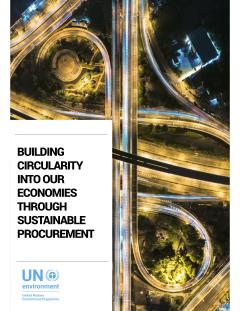
Public procurement wields enormous purchasing power, accounting for an average of 12 percent of gross domestic product (GDP) in countries of the Organisation for Economic Co-Operation and Development (OECD). Leveraging this purchasing power by buying more sustainable goods and services can help drive markets in the direction of sustainability. In addition, the private sector and NGOs are showing global leadership in sustainable procurement. In so doing, they are seeking to reduce their organisations’ risks, encourage sustainability in their value chain and, in some cases, reduce costs. By incorporating sustainability requirements into the sourcing process, private organisations convey a strong market signal, which can in turn drive down the cost of sustainable products and services.
This report introduces the role that sustainable procurement can play to accelerate the transition to a circular economy and the shift towards more sustainable patterns of consumption and production. In particular, the report recommends that global leaders:
- Convene focused high- level public-private dialogues. This could lead, for example, to the further development of more detailed guidance for public and corporate procurers.
- Promote work at national and regional levels to disseminate sustainable procurement for circularity.
- Facilitate the incorporation of sustainable procurement efforts in sectoral initiatives (e.g. plastics, electronics). The adoption of sustainable production practices in sectoral value chains will be accelerated by the creation of a market demand through sustainable procurement, including circularity requirements and by facilitating global value chain collaboration and dialogue, including through building on current sector sustainability initiatives.
